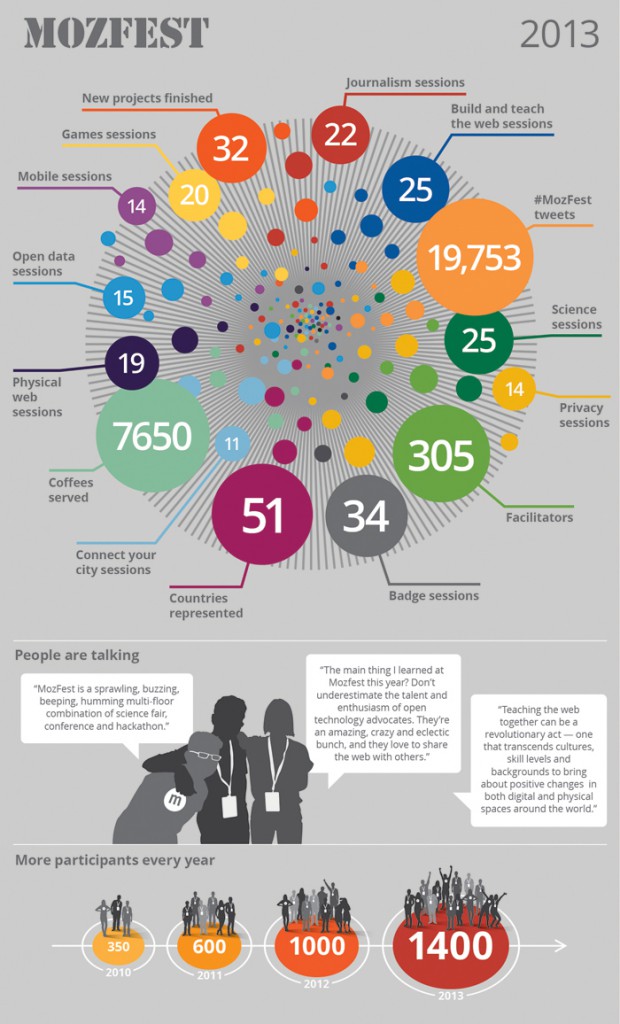In just a month’s time from now, Mozilla will be hosting their annual Mozilla Festival (“MozFest” for short), which for the 2nd year will feature a Science Track, which this year we will be contributing to through a 3-hour sprint on author contributors hip, the journal article, and the Open Badges Infrastructure. We’re organising this with our friends at PLoS, the Wellcome Trust, ORCiD, Digital Science, and Digital Me. Look out for our blog in the next few days where we’ll go into more detail about this session.
hip, the journal article, and the Open Badges Infrastructure. We’re organising this with our friends at PLoS, the Wellcome Trust, ORCiD, Digital Science, and Digital Me. Look out for our blog in the next few days where we’ll go into more detail about this session.
MozFest is where communities working in technology, design, education, journalism, and research come together to innovate in the space of the Web. It’s for coders and non-coders alike. Bring everything from your laptop to knitting needles (and that includes kids—it’s for all ages!).
But most importantly, it’s a place for people interested in the Web and science to come together not only to talk about, but to hack away at, how the Web can help us do more, do better, and connect up with likeminded people from different fields around a common cause.
Who will be there?
You might have heard of the now year-old Mozilla Science Lab and their Software Carpentry program, whose mission is to teach scientists how to code using best practice and how to teach others to code.
It’s an initiative that has been greatly needed across the sciences. The Software Carpentry gang will be there as well as Kaitlin Thaney and the two newest members to Mozilla Science Lab (Bill Mills and Abby Cabunoc).
The entire Mozilla Foundation will also be there – that includes the people from the Open Badges project to the Web Maker community.
When and Where?
October 24-26 in London near the O2Arena.
Still not sure what this is about…
To use its own words, the science track of MozFest aims to use “the open web to re-define how we experiment, analyze and share scientific knowledge”.
The best way to learn more about MozFest is to take a look at the website and its tracks. But also take a look at the list of science sessions accepted, which include working with some of the new authoring tools out there like Authorea and iPython Notebooks, and our session working with the Open Badges Infrastructure to bring more credit to all the work one does as a researcher beyond publications and position titles:
Sprint sessions:
- Science in the browser – Michael Saunby (Met Office)
- Storytelling from space – Brian Jacobs (ProPublica)
- Upscience – Francois Grey (CERN) et al
- Open Science Badges for Contributorship – Amye Kennall (BMC), Patrick Polischuk (PLoS), Liz Allen (Wellcome Trust), Laura Paglione (ORCiD), and Amy Brand (Digital Science)
- Authoring tools – Alberto Pepe (Authorea), John Lees-Miller + John Hammersley (writeLaTeX), Raghuram Korukonda
- Improving Reference Management in Wikipedia – Daniel Mietchen (Wikimedia
- Building a Repository of Open Tools – Kathleen Luschek (PLOS)
- Text as data – humanities and social science – Fiona Tweedie (Univ. Melbourne)
- Zooniverse: Open Source Citizen Science – Robert Simpson (Zooniverse)
- Apps for Climate Change: using Appmaker for Citizen Science – Brian Fuchs (Mobile Collective)
- Curriculum Mapping for Open Science – Fabiana Kubke (Univ. Auckland) ; Billy Meinke (Creative Commons)
- Network Analysis Visualisation for the Web – Matt Hong (Knight Lab)
- Hacking hacking the library – Dave Riordan (New York Public Library)
- Web audio as an open protocol – Jeffrey Warren (Public Lab)
- Working with open health data – Fran Bennett (Mastodon C)
- Learn how to build cool things with weather data in Python – Jacob Tomlinson (Met Office)
- PressureNET – Jared Kerim (Mozilla)
- Building Pathways to Careers in Science – Lucas Blair
Trainings / Tutorials:
- Academic Publishing Using Git and GitHub – Arfon Smith ; Jessica Lord (GitHub)
- Intro to IPython Notebook – Kyle Kelley (Rackspace)
- Collaborative Development: Teaching data on the web – Karthik Ram (rOpenSci)
- Dealing with Messy Data – Milena Marin (OKFN)
- Indie Science – Cindy Wu (Experiment.com)
- Learning Analytics – Adam Lofting, Doug Belshaw (Mozilla)
- Spreadsheets – Milena (OKFN)
Other sessions:
- Open Science Collaboration for Development – Angela Okune (iHub)
- Teen-Driven Open Science – David Bild (Nature Museum)
- Scientific peer review: identifying conflicts and fraud – Rebecca Lawrence (F1000)
- “Can you help me ‘break’ my project?” – Knight Lab students
But it would be a waste to go to MozFest and never leave the science floor. Jump around to the different floors, explore. A full list of proposals is here.
Don’t forget to register. See you soon!
Comments